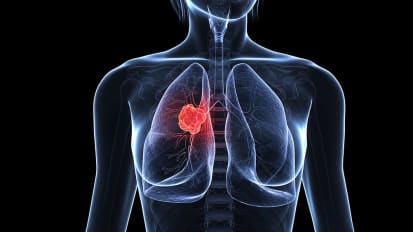Fox Chase Cancer Center
To refer a patient call 888-FOX-CHASE (888-369-2427)
Temple Lung Center
To refer a patient call 800-TEMPLE-MED (877-589-0013)
Featured Items |view more
 Course
Course
AI-Powered LDCT: Temple Establishes New Paradigm for Lung Disease Detection
Pulmonologists are at the forefront of detecting and managing lung disease - and now, artificial intelligence (AI) is redefining what’s possible in early detection and workflow efficiency. The Temple Lung Center has become the first pulmonary ...
 Symposium
Symposium
Thoracic Malignancies: A Review of the Latest Evidence
Great therapeutic strides have been made for non-small cell lung cancer (NSCLC). In this CME, renowned specialists from Fox Chase Cancer Center, Temple Lung Center, Johns Hopkins Medicine, Yale Medicine, MedStar Georgetown University Hospital, ...
 News
News
A More Accurate, Less Invasive Analysis for Lung Cancers: RNA Next-Generation Sequencing
Genetically targeted therapy for lung cancer can make treatment much more effective, but identifying the specific gene fusions involved in the disease remains a challenge.
 News
News
Comprehensive Care That Empowers Patients Through Risk Assessment, Prevention, Detection, Treatment, and Survivorship
 News
News
Bispecifics: A Molecular Missile That Labels Cancer Cells and Kills Them
A relatively new classification of immunotherapeutic drugs is pushing the outer limits of late-line treatment, bringing new hope to patients and the cancer community. They’re bispecific antibodies.
 Document
Document
Each year, more lung cancer patients die from their disease than prostate, breast and colon cancer patients combined, making it the leading cause of deaths worldwide.
 Document
Document
DEPARTMENT OF HEMATOLOGY/ONCOLOGY THORACIC CANCERS CLINICAL TRIALS
For general questions about clinical trials, call 215-214-1515 or visit FoxChase.org/ClinicalTrials.
 Document
Document
Temple Healthy Chest Initiative: a New Approach to Lung Cancer Screening
Physicians at Temple Health have developed the Temple Healthy Chest Initiative to screen, diagnose, treat, and support patients who are at the greatest risk of developing lung cancer due to a history of smoking.
 Document
Document
Temple – Fox Chase Thoracic Surgery
The thoracic surgery program at Temple Health provides high-quality surgical care for a wide range of conditions, from benign to thoracic malignancies in the lungs, esophagus, airways, pleura, or chest wall.
 Symposium
Symposium
Management of Early Stage Non-Small Cell Lung Cancer
This conference was presented by Fox Chase Cancer Center, the Temple Lung Center, and the Temple Health Office for Continuing Medical Education. It was designed as a forum for discussion of advances in technology and treatment of early ...
 News
News
Molecular Profiling Continues to Shape the Future of Cancer Care
Unraveling the genome to reshape cancer care.
 News
News
High Expectations for Adoptive Cell Therapy for Treatment of Solid Tumors
A partnership between the Fox Chase solid tumor oncologists and their colleagues in bone marrow transplantation tests the potential of adoptive cell therapies for the treatment of solid tumors.
 News
News
Immunotherapy for Never Smokers with Non-Small Cell Lung Cancer
To further evaluate the use of immunotherapy for these patients with NSCLC, Treat is serving as a primary investigator in a nationwide Phase II, double-arm, randomized clinical trial of treatment-naïve never smokers without the EGFR driver ...
 News
News
Pulsed Low-Dose-Rate Radiation Offers New Treatment Option for Variety of Solid Tumors
Clinicians at Fox Chase Cancer Center are exploring how an established radiation technique—pulsed low-dose-rate radiation (PLDR)—might benefit patients with a variety of solid tumors.
 News
News
Temple Healthy Chest Initiative: Early Diagnosis Leads to Better Treatment Options
The Temple Healthy Chest Initiative is a comprehensive, multidisciplinary program that is designed to provide people in the Philadelphia region access to chest health screening, prevention and treatment options.
 News
News
Temple Healthy Chest Initiative: Screening for Lung Cancer Can Be the Bridge to Better Care
With expanded 2021 guidelines from the U.S. Preventive Services Task Force for lung cancer screening of current and former smokers, many health care organizations are ramping up their screening efforts.
 News
News
Fox Chase at Temple University Hospital Lung Cancer program Info
Specialists in the Lung Cancer Program at Temple provide advanced care for lung cancer, from detection to treatment through recovery and survivorship.